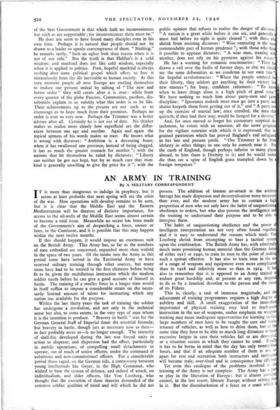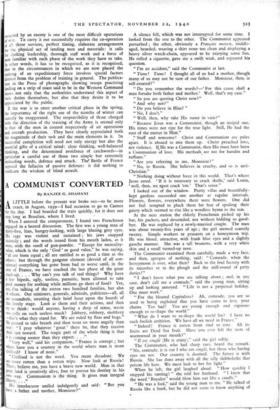AN ARMY IN TRAINING
By A MILITARY CORRESPONDENT
IT is more than dangerous to indulge in prophecy, but it 1. seems at least probable that next spring will see the crisis of the war. How operations will develop remains to be seen, but it is clear that the Middle East and the Eastern Mediterranean will be theatres of decisive importance, for access to the oil-wells of the Middle East seems almost certain to become a vital issue. Meanwhile no secret has been made of the Government's aim of despatching a force, sooner or later, to the Continent, and it is possible that this may happen within the next twelve months.
If this should happen, it would impose an enormous task on the British Army. This Army has, so far as the numbers of men embodied are concerned, expanded more than tenfold in the space of two years. Of the intake into the Army in this period some have served in the Territorial Army or have received military training through other sources, but many more have had to be trained in the first elements before being fit to be given the multifarious instruction which the modern soldier needs before he can give a good account of himself in battle. The training of a smaller force in a longer time would in itself suffice to impose a considerable strain on the neces- sarily limited amount of talent for instructing which any nation has available for the purpose.
Within the last thirty years the task of training the soldier has undergone a revolution, and not only in the technical sense but also, to some extent, in the very type of man whom it is the intention to produce. "Bravery in battle" was for the German General Staff of Imperial times the essential formula; but bravery in battle, though just as necessary now as then— in fact probably more so—is no longer enough. The intensity of shell-fire developed during the last war forced units in action to disperse; and dispersion had the effect, particularly in mobile operations, of compelling small detachments to operate, out of reach of senior officers, under the command of subalterns and non-commissioned officers. For a considerable period there raged, on the German side, a controversy between young intellectuals like Geyer, in the High Command, who wished to base the system of defence, and indeed of attack, on individualism, and older officers, like Von Lossberg, who thought that the execution of these theories demanded of the common soldier qualities of mind and will which he did not possess. The addition of intense air-attack to the artille barrage has made dispersion and decentralisation more necessa than ever, and the modern army has to contain a hig proportion of men who not only have the habit of unquestionin obedience to orders, but who also possess the intelligence an the training to understand their purpose and to be able t interpret them.
The habit of unquestioning obedience and the power o intelligent interpretation are not very often found together and it is easy to understand the reasons which made Vo Lossberg shrink from attempting to base a tactical syste upon the combination. The British Army has, with admitted' much more promising human material than the German Arm of either 1917 or 1940, to train its men to the point of makin such a system effective. It has also to train men in the u of a range of weapons and equipment even more complicat than in 1918 and infinitely more so than in 1914. It ha also to remember that it is opposed to an Army trained t endure great hardship and, at present at any rate, inspir to do so by a fanatical devotion to the person and the caus of its Fiihrer.
This is, clearly, a task of immense magnitude, and th adjustment of training programmes requires a high degree o subtlety and skill. A small exaggeration of the immediat importance of physical training may lead to inadequat instruction in the use of weapons, undue emphasis on weapo training may mean inadequate opportunities for learning tactics large numbers of men have to be taught the care and main tenance of vehicles, as well as how to drive them, but at th same time they have to be able to march long distances wi:hou excessive fatigue in case their vehicles fail or are destroye or a situation occurs in which they cannot be used. Finall it has to be borne in mind that the day has only twenty-fo hours, and that if an adequate number of them is not s apart for rest and recreation both instructors and instruct will become stale, over-tired and in consequence less efEcien Yet even this catalogue of the problems involved in di training of the Army is not complete. The Army has a p to play in the liberation of Europe: but it almost certainl cannot, in the last resort, liberate Europe without setting f in it. But the disembarkation of a force on a coast which
•
occupied by an enemy is one of the most difficult operations g war. To carry it out successfully requires the co-operation of all three services, perfect timing, elaborate arrangements for the physical act of landing men and materials: it calls for dashing leadership, thorough staff work and a force of men familiar with each phase of the work they have to take. m other words, it has to be recognised, as it is recognised, :hat in the circumstances in which we are now placed the raining of an expeditionary force involves special factors distinct from the problem of training in generaL The publica- :Mn in -the Press of photographs showing troops practising landing on a strip of coast said to be in the Western Command shows not only. that the authorities understand this aspect of their duties themselves, but also that they desire it to be appreciated by the public.
If the war is to enter another critical phase in the spring, the importance of the right use of the months of winter can scarcely be exaggerated. The responsibility of those charged with the direction of the training of the Army is second only to that of the men in control respectively of air operations and aircraft production. They have clearly appreciated both the magnitude of -their task and the main elements in it. Its successful completion will need not only energy but also the essential gifts of a critical mind: clear thinking, well-balanced thinking, and the determined avoidance of catchwords—in particular a careful use of those two simple but extremely misleading words, defence and attack. The Battle of France exposed the fallacies of passive defence: it did nothing to vindicate the wisdom of blind assault.



























































 Previous page
Previous page